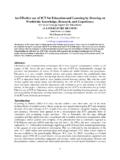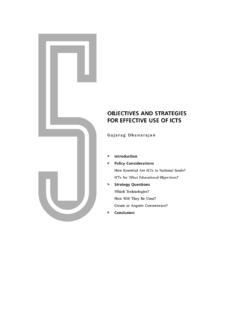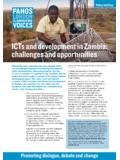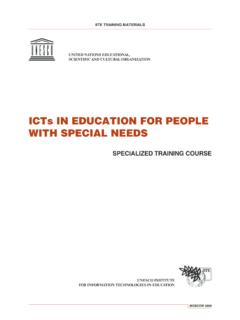Transcription of Development Informatics Working Paper no.42: …
1 Development Informatics Working Paper Series The Development Informatics Working Paper series discusses the broad issues surrounding information, knowledge, information systems, and information and communication technologies in the process of socio-economic Development Paper No. 42 The ICT4D Manifesto: Where Next for icts and International Development ? RICHARD HEEKS 2009 ISBN: 978-1-905469-11-6 Published by: Development Informatics Group Institute for Development Policy and Management University of Manchester, Arthur Lewis Building, Manchester, M13 9PL, UK Tel: +44-161-275-2800/2804 Email: Web: View/Download from: Educators' Guide from: Table of Contents Abstract.
2 1 A. WHY ICT4D? .. 2 B. FROM ICT4D TO ICT4D TO ICT4D .. 2 What Happened During ICT4D .. 4 C. ICT4D 'S NEW TECHNOLOGICAL PRIORITIES .. 5 New Hardware .. 6 New Applications .. 9 D. ICT4D 'S NEW INNOVATION MODELS .. 13 E. ICT4D 'S NEW IMPLEMENTATION MODELS .. 16 Funding ICT4D .. 16 Implementing ICT4D .. 17 F. ICT4D 'S NEW WORLDVIEWS FOR ACTION .. 21 Integrating Perspectives .. 23 G. CONCLUSION .. 28 References .. 30 Manchester Centre for Development Informatics Working Paper 42 1 The ICT4D Manifesto: Where Next for icts and International Development ? Richard Heeks Development Informatics Group University of Manchester, UK 2009 Abstract1 ICT4D the application of information and communication technologies for international Development is moving to a new phase.
3 This will require new technologies, new approaches to innovation and implementation, new intellectual perspectives and, above all, a new view of the world's poor. All these must be understood if we are to harness digital technologies in the service of some of our world's most pressing problems. This Paper explains the phase change from "ICT4D " to "ICT4D " and its implications. The background to these phases is reviewed, charting the logic and chronology of applying icts in developing countries. The implications of the phase change are then analysed. First, in terms of new technology and application priorities. Then, in relation to new models of innovation we may need to embrace: from laboratory to collaborative to grassroots innovation.
4 Next, in relation to new implementation models for funding, managing, and applying digital technology. Finally, the Paper looks at necessary new worldviews to guide our thinking and our policies in this field; integrating perspectives from computer science, information systems and Development studies. Additional commentaries and models provide a further set of rich insights into the future of ICT4D. 1 This Paper is a Development of an earlier article: ICT4D : the next phase of applying ICT for international Development , IEEE Computer, 41(6), 26-33. Manchester Centre for Development Informatics Working Paper 42 2 A. Why ICT4D?
5 Before proceeding, we should ask "why ICT4D"? Why should we give any priority to ICT application for the poor in developing countries? First, there is a moral argument. Most Informatics professionals spend their lives serving the needs of the world's wealthier corporations and individuals to borrow bank robber Willie Sutton's phrase "because that's where the money is". Yet seeking to squeeze a few extra ounces of productivity from firms that already perform relatively well, or save a few minutes in the life of a busy citizen pales in ethical importance compared to applying new technology to the mega-problems of the planet. It is the poor of the world who are on the front-line of those problems.
6 From climate change to conflict and terror; from disease to resource depletion it is the poor in developing countries who suffer most. And, of course, they suffer from that other blot on the world's conscience poverty with more than half the global population living on less than two US dollars per day. Then, there is enlightened self-interest. In a globalised world, the problems of the poor today can through migration, terrorism, disease epidemics become the problems of those at the top of the pyramid tomorrow. Conversely, as the poor get richer, they buy more of the goods and services that industrialised countries produce, ensuring a benefit to all from poverty reduction. And finally there is personal self-interest.
7 Compare designing a system for an African or Asian community to doing the same for a company in the global North. The former is quite simply more interesting a richer, more satisfying, more colourful experience. That answers the "why 4D" component but what about the "why ICT" half? Why invest in digital technologies rather than, say, a tubewell to allow access to water? The standard response is "we need to invest in both", arguing that Development requires water and information and/or that icts can improve the planning and management of tubewell projects. A more assertive response might give a macro-level answer. Economic, social and political life in the 21st century will be increasingly digital, and those without icts will be increasingly excluded.
8 And it might give a micro-level answer. Ask poor communities or look at how they spend what little money they have not always, but sometimes, they prioritise the ICT option. B. From ICT4D to ICT4D to ICT4D The first digital computer put to use in a developing country was installed in Kolkata in 1956 at the Indian Institute of Statistics for numerical calculation work1. From that early start until the 1990s, there were two application emphases in the use of computing for Development . Initially, government was the key actor, and IT (as it then was, rather than ICT) was applied mainly to internal administrative functions of the public sector in developing countries. During the 1980s, the multinationals and Manchester Centre for Development Informatics Working Paper 42 3 other firms came to the fore, and IT epitomised by the advent of the microcomputer and its associated software was seen as a tool for delivery of economic growth in the private sector.
9 We might thus christen this "ICT4D " period IT4G information technology for government; then overtaken by information technology for growth. Two things happened in the 1990s that gave birth to what might recognisably be called ICT4D The first was general availability of the Internet. The second was the Millennium Development Goals (MDGs). The Internet sparked an upsurge of interest in icts , including a reinvigorated interest in how icts might be applied in developing countries. At the same time, international Development began to move back up the political agenda. This move was given impetus by the search for concrete targets; emerging first as the International Development Goals in 1996, and then formalised as the MDGs by the September 2000 Millennium Declaration which sought particularly to reduce poverty, and improve health and education and gender equality.
10 The digital technologies of the 1990s, then, were new tools in search of a purpose. Development goals were new targets in search of a delivery mechanism. That these two should find each other and fall in love was not unexpected. They had a baby called "ICT4D", born in a flurry of publications, bodies, events, programmes and project funding: the 1998 World Development Report from the World Bank, highlighting the role of information, knowledge and icts in Development ; the creation by the G8 countries of the Digital Opportunities TaskForce in 2000, setting an agenda for action on ICT4D; and the World Summits on the Information Society held in Geneva in 2003 and Tunis in 2005, acting as key learning and policy-formation points along the ICT4D path.


















